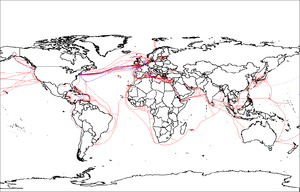

A global network is any communication network that spans the entire Earth. The term, as used in this article, refers in a more restricted way to bidirectional communication networks based on technology. Early networks such as international mail and unidirectional communication networks, such as radio and television, are described elsewhere.
The first global network was established using electrical telegraphy and global span was achieved in 1899. The telephony network was the second to achieve global status, in the 1950s. More recently, interconnected IP networks (principally the Internet, with estimated 2.5 billion users worldwide in 2014[1]), and the GSM mobile communication network (with over 6 billion worldwide users in 2014) form the largest global networks of all.
Setting up global networks requires immensely costly and lengthy efforts lasting for decades. Elaborate interconnections, switching and routing devices, laying out physical carriers of information, such as land and submarine cables and earth stations must be set in operation. In addition, international communication protocols, legislation and agreements are involved.
Global networks might also refer to networks of individuals (such as scientists), communities (such as cities) and organizations (such as civil organizations) worldwide which, for instance, might have formed for the management, mitigation and resolution of global issues.
- ^ "Global Internet Usage Stats" (PDF). KoMarketing Associates. Archived from the original (PDF) on 2022-12-19. Retrieved 2022-09-29.